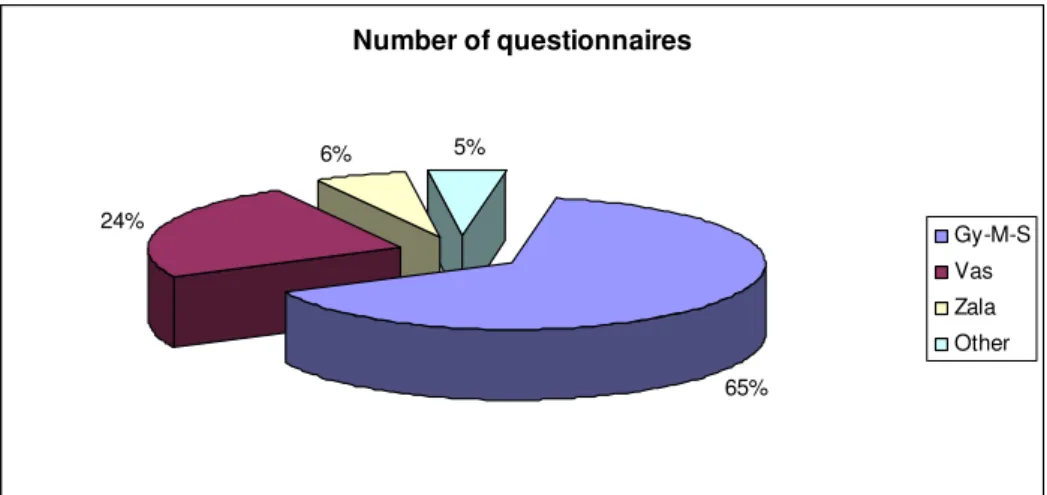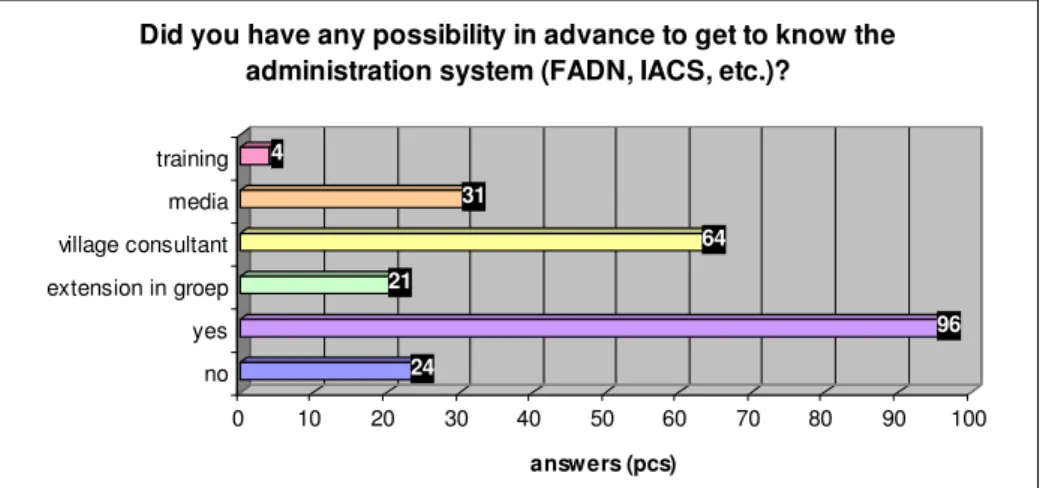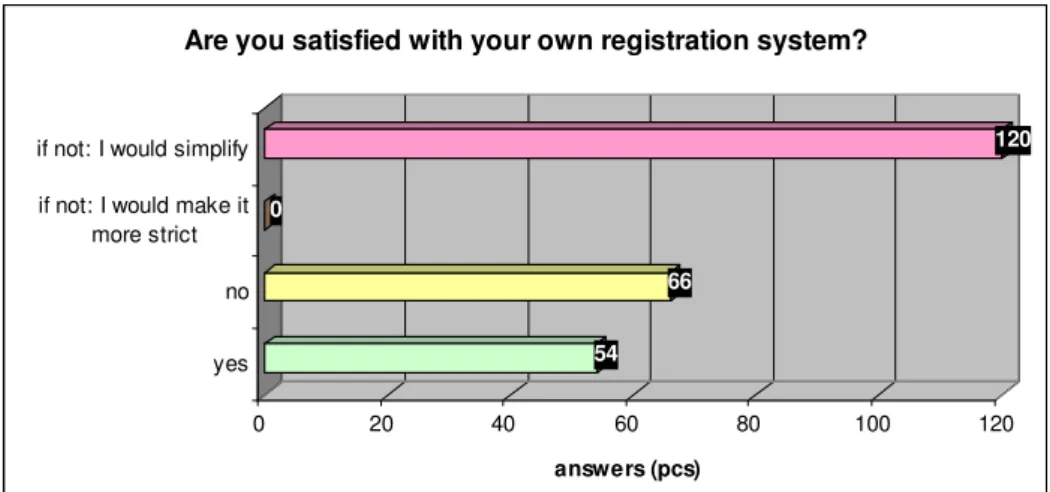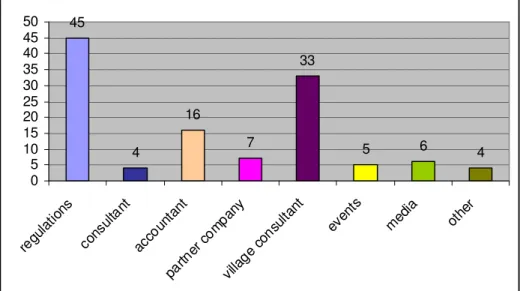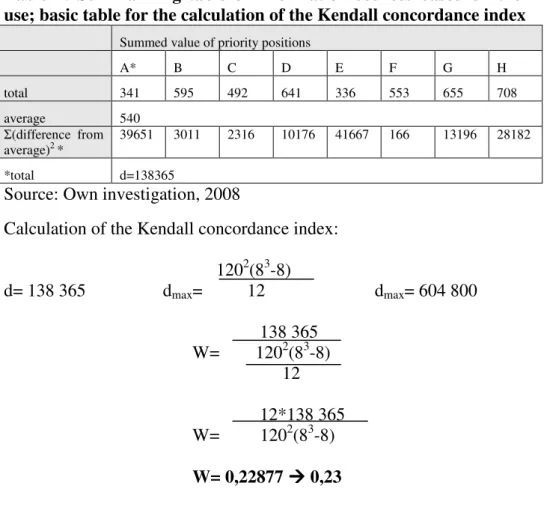THESIS OF PhD DISSERTATION
KÁLDI, JUDIT
MOSONMAGYARÓVÁR 2008
THESIS OF DOCTOR OF PHILOSOPHY (PhD) West-Hungarian University
Faculty of Agricultural and Food Sciences Institute of Economic Sciences
Mosonmagyaróvár
Ujhelyi Imre Animal Sciences School of Doctor’s Manager of School of Doctor’s:
DR. BENEDEK, PÁL
Director of the Institution, University teacher, Doctor of Hungarian Academy of Sciences (MTA)
Programme for the economic issues of producing, processing and distribution of animal products
Leader of programme:
DR. TENK, ANTAL
University teacher, Candidate of Agricultural Sciences
Leader of topic:
DR. NAGY, FRIGYES PhD University teacher
AGRICULTURAL REGISTRATION SYSTEM AND ITS DEVELOPMENT POSSIBILITIES
Completed by:
KÁLDI, JUDIT
Mosonmagyaróvár 2008
1. INTRODUCTION, OBJECTIVES OF RESEARCH
Before the system transformation a dual economic structure was characteristic to Hungary. On one hand approximately 1300 large scale agricultural units operated (producing app. three fourth part of production value) with statistical data and information publishing obligation. On the other pole more than one million household and subsidiary farms existed, providing app. one fourth of the production value); the accurate registration of production and sales data was less characteristic to these farms. Changes in agriculture – transformation of cooperatives, privatisation of agricultural land etc. – have resulted the establishment of more small- and middle scale agricultural units. Concerning these units, accurate and reliable data were often and still are missing, mainly because of farmers’ fear or aversion to providing data, based on former, possible bad experiences. The process of transformation also changed the availability of information and information demands of the participants of the agricultural sector. Small-scale producers providing a considerable part of agricultural production, but also economic organisations being established after the transformation of cooperatives are not suitably supported by production, sales and advisory information.
The Common Agricultural Policy (CAP) of the European Union is subject to significant changes since the ‘80s. The McSharry reform (introduction of direct compensation payments) in 1992 should be emphasized, as the reform considerably increased the scope of administrational problems of agricultural supports. This is mirrored in the institutional structure as well. Therefore the introduction of a more sensitive information system was needed. The comprehensive reform of the CAP was continued in 2000 and 2003 with decoupling direct supports from production and sales.
Nowadays several different institutions – often with overlaps in competence – are trying to satisfy informational needs in Hungary. Their services are not always harmonized and do not fully satisfy the needs of either the farmers or the managing authorities. In case some information is not available or cannot be reached in time, farmers – even if it does not mean considerable damage – loose profit indirectly. The same situation applies vice versa.
The registration and agricultural information system in Hungary needed to go under considerable harmonisation changes. One important task was to provide agricultural producers with suitably detailed and timely information on the new tasks, to prepare them for the EU support
possibilities. This information should continuously be communicated to farmers, as the support system is due to constant changes. The village consultant network plays an important role in this process, being the primer source of information for most farmers. The role of agricultural advisors should also be emphasized.
Based on the above-written situation the following objectives of the research have been defined:
1. To investigate the need for information and registration discipline of the farmers.
2. To compare our national registration systems with other EU member countries (Austria, France, The Netherlands, Germany) and based on the comparison to make useful suggestions for the Hungarian system.
3. To investigate how the continuous data registry – obligatory in the EU – contributes to the short- and long-term decisions.
4. To highlight the position of certain obligatory and volunteer registries in the agricultural information system.
5. To define areas where intervention is needed, and to define the possible advantages.
2. MATERIAL AND METHOD
The research activity can be divided into four parts. In the first phase domestic and foreign professional literature has been collected and compared, coinciding the authors’ opinions and results.
In the following phase the registration systems of some EU member states are introduced with descriptive method.
The investigation of the introduced agricultural information and registration system of the EU member states took place during foreign study tours and by personal discussions, consultations with experts in the given countries. It was possible to investigate the agricultural documentation system in Germany from 2003, in Austria and in The Netherlands from 2004.
The third phase of the research included a questionnaire survey – the basis of primer data collection – in the West-Transdanubian region.
The target group of the survey consisted of private farmers in the West-Transdanubian region. 500 questionnaires have been mailed to private farmers in 2006. The data base for the questionnaires originated from former research activities of the University of West-Hungary
Faculty of Agricultural and Food Sciences Institute of Economic Sciences and partly has been provided by the Ministry of Agriculture and Rural Development (MARD). Farmers registered by the regional offices of the MARD have been included in the data base. The survey covered the main entrepreneurial forms (primary producer, private entrepreneur, cooperative).
The sample could not be defined as suitably representative, as the filling in of the questionnaire was not obligatory. Statistical sampling has been carried out with the method of proportional sampling, but as only several interviewed clients have answered the questionnaire, sampling cannot be considered as randomized sampling process. 2 homogeneous sampling groups have been formed within the heterogeneous data base:
based on the three counties of the Trans-Danubian region, and then further groups based on the entrepreneurial forms (primary producer, private entrepreneur and joint farming) have been defined. The elements of the sample have been defined with randomized sampling, keeping the shares of the certain entrepreneurial forms in each group.
The questionnaire has been elaborated with the objective of having interesting and useful information for both the research and the practice. In order to speed up the filling in and facilitate the computerized processing, several closed questions have been included. Answering the open questions the interviewed producers had a chance to write down their personal experiences and personal impressions regarding the topic.
Both quantitative and qualitative methods have been applied. The testing of the questionnaire has been conducted by personal interviews with a group of farmers. The modified, final version has been mailed by post both to the private farmers and economic organisations.
The 120 (24 %) questionnaires with valuable answers have been returned within three weeks. Further 20 questionnaires (5 %) have not been included in the investigations due to incomplete filling in.
The last phase of the research, the second part of the own investigations is based on deep interviews carried out with national and foreign agricultural experts and private entrepreneurs. The objective of the interviews was the better understanding of the practical side of the theme, to collect the opinions of experts who are involved in the information and registration systems. The deep interviews have been carried out on basis of a group of questions defined beforehand;
questions were similar to those included in the questionnaire survey.
During the investigations several discussions and consultations have been carried out with national and foreign experts, agricultural advisors, representatives of chambers of agriculture and private farmers.
Participations on domestic and foreign study tours and on professional conferences have also meant an important part of the research.
One method of data evaluation was the Kendall concordance index – a priority correlation method –, as the questionnaire included several questions where farmers could define priority orders concerning the information resources, based on their practical application.
Professional literature in the topic of the dissertation does not introduce this method; therefore the application of this index is a novel method – giving a reason why this index has been chosen for the evaluation.
The concordance index is suitable to evaluate variables without concrete values, or their values cannot be defined by numbers (priority orders can be defined by the “suitability”, volume of the values). The multitude with priority order is called ordinal indices by the professional literature. Priority correlation is based on the connection between two or more variables of the ordinal scales. Priority correlation investigates whether some characteristics of the sample groups are characteristic in the same order (SZÜCS, 2004).
The index can have a value between 0 and 1. The better the level of agreement among the questioned, the higher is the value of the index.
The level of agreement can be considered to be good above 0,6 value.
Another method of evaluation was the so-called association indices to define the closeness of connection between two qualitative characteristics. These indices define the nature of connection between the factors with one number. Based on the questions applied in the questionnaire, it was possible to calculate both the Yule and the Csuprov association indices.
3. RESULTS, CONCLUSIONS
The dissertation collected and compared domestic and foreign professional literature, coinciding the authors’ opinions and providing some critical notes.
Both national and international literatures deal little with the role and significance of agricultural registration systems. Among the international literature MASSOLINI (2001) publishes comprehensive studies about the agricultural registration system of the European Union.
However the investigation level is not uniform and the share of certain fields (e.g. land use, production statistics etc.) are not adequate. It is more a study on statistical systems and not a summarizing work of the characteristics of registration systems. The informational environment did not receive enough attention at the beginning, but even since the changes this field is quite neglected.
In Hungary the works of FEHÉR (2003), HORVÁTH (2003), KAPRONCZAI (1998, 1999, 2000, 2003) and NÉMETH (1997) are competent. Regarding the topic of dissertation, the study of KAPRONCZAI (2007): „Information systems in service to common agricultural policy” served as a basis, similarly to the Green Book (2007) of the MoARD introducing the simplification of the agricultural regulation system.
The role of information has increased considerably for a well- operating agricultural unit. Nowadays market conditions change rapidly, and farmers should be able to apply the support and market regulation system of the EU. In this situation farmers should not only maintain production, but they have to take part in the increasing competition with the production of quality products. It is essential for farmers to register income and costs – partly because of their own inner information system, and also because of the taxation rules.
Inner information needs are satisfied from different registrations, notes, own data, knowledge and experiences. Such information sources are sowing plans, farming dairy, animal keeping registrations etc. for the farmers. Information systems are characterised by two-direction information flow, from farmers to decision makers of the agricultural regulatory systems, and vice versa to the farmers.
Farmers mainly receive processed information and what they read in the newspaper or hear from advisors is very important to them. Figure 1 shows the share of farmers interviewed by the questionnaire and operating in the counties of the West-Transdanubian region.
A major part, 65 % of the questionnaires have been sent out to Gyır-Moson-Sopron County. The reason for this high value is that the same share was characteristic to former investigations, 65 % of the registered agricultural producers in our database operate in Gyır-Moson- Sopron County. Much attention was paid to keep the share of the counties in the sampling process.
Number of questionnaires
65%
24%
6% 5%
Gy-M-S Vas Zala Other
Figure 1: Share of returned questionnaires (n=120) Source: Own research, 2006
Evaluating the results it can be stated that farmers with agricultural educational background are more accurate and consequent in keeping the records, and pay more attention to trace information from different sources. This information is collected personally, sometimes through village consultants or advisors; exchange of experiences among the farmers is very rare, it was mentioned on only 5 % of the questionnaires. This phenomenon was supported by the deep interviews, when mainly information on support possibilities (to increase income and the competitiveness of production) were mentioned. 89 % of the answering farmers have some kind of agricultural education, which is a very good share.
Investigations show that farmers farming on more than 50 ha are more forced to keep the agricultural and book-keeping records and they feel the need for keeping them accurately, than those farmers who are engaged in plant production or animal keeping only for supplementary income, in part-time. The share of plant producing farmers was higher among the returned questionnaires; therefore categories based on animal numbers could not be created.
Besides general information the questionnaire includes questions on specific issues like the availability of information on registration systems, on the regulation system of the CAP before the EU accession and if yes, in what form this information was provided (Figure 2).
80 % of farmers received information before the 2004 EU accession on the possible future changes of the CAP, but still the share of
farmers giving a “no” answer to this question is very high. The question rises why 20 % of farmers did not have information about the changes in the registration system, in spite of the numerous articles in professional papers and magazines, presentations by village consultations and numerous group advisory events that were organised in the topic.
24
96 21
64 31
4
0 10 20 30 40 50 60 70 80 90 100
answers (pcs) no
yes extension in groep village consultant media training
Did you have any possibility in advance to get to know the administration system (FADN, IACS, etc.)?
Figure 2: Information on registration systems (n=120) Note: multiple choice questions
Source: Own investigations, 2006
This problem was brought up during discussions with experts.
The interviewed experts agreed that inadequate, sometimes opposite information was available concerning the changes of the registration system or the support policy. One reason can be that the harmonisation of the registration systems to the EU expectations took place late and quite rapidly in the preparation process.
83 farmers from the sample keep the records on daily basis. 39 % of this group registers only basic income-cost data; others mention different records like the registration of current and fixed assets etc.
The opinion of farmers on the applicability of the registration system was also important to know; whether they keep these records themselves or if not, who helps them (Figure 3 and 4).
In spite that 54 (45 %) farmers are satisfied with their registration system, all farmers (100%) indicated that they would simplify their own system. During the deep interviews farmers gave a reason that at peak seasons (like harvesting, ploughing, plant protection etc.) administrative works are overshadowed.
54 66 0
120
0 20 40 60 80 100 120
answers (pcs) yes
no if not: I would make it
more strict if not: I would simplify
Are you satisfied with your own registration system?
Figure 3: Rate of satisfaction with own registration system (n=120) Source: Own investigations, 2006
54
31 35
0 10 20 30 40 50 60
answers (pcs)
no family help from outside
Do you take any help to fulfill the registration requirements?
Figure 4: Whose task is the keeping the records? (n=120) Source: Own investigations, 2006
Figure 4 shows who is responsible for keeping the records. 45 % of the answering farmers do not have external assistance and keeps all book-keeping and production-related records himself. App. 26 % asks for help from a family member, and only 29 % has external assistance, mainly for book-keeping tasks.
Concerning information sources 95 farmers of the answering 120 keeps continuous contacts with village consultants for information purposes; 59 follows the changes in regulations directly. 46 farmers participated on professional forums where exchanges of experiences and results mean important sources of information for them. 39 farmers ask
the book-keepers directly for book-keeping and taxation issues, and only 25 farmers get information primarily from the media. 24 farmers mentioned that they keep continuous contact with agricultural advisors.
17 farmers indicated that it is important to collect information from the partners, mainly concerning production, basic material supply questions.
Among the answering farmers the assistance of village consultants is dominant, as 79 % keeps continuous contacts with village consultants. This fact is proven by the results of the personal deep interviews where similar answers were given. The task of the village consultants is very important. They help farmers filling in support- requesting forms, organise professional forums and lectures, and also provide agricultural data for the decision makers of the agricultural sector.
During the deep interviews the interviewed 10 farmers gave the following answers to the question of in what topics they turn to village consultants:
• questions on market relations and tendencies (30 %);
• support-requests and project applications (90 %);
• elaboration of business plan (60 %);
• explanation of legal regulations (50 %);
• land rent, land purchase (90 %);
• other issues like natural catastrophes, technology, producers’
organisations etc. (60 %).
Many farmers use information sources that were not listed among the above factors (Figure 5), these are indicated under the “other”
heading. Such information sources are:
• product councils, newsletters of professional organisations;
• group advisory events, lectures;
• information from neighbours, colleagues etc.
45 farmers believe that it is important to have information on regulations and their modifications. 33 farmers mentioned that continuous meetings and consultations with village consultants guarantee enough information level for them. 16 consult primarily with their book-
keepers. Only a very little in number turn to agricultural advisors, take part in professional forums or rely on information published in the media.
45
4
16
7
33
5 6 4
0 5 10 15 20 25 30 35 40 45 50
regulations
consultant
accountant partner com
pany
village consultant
events
media
other
Figure 5: Importance of different information sources (n=120) Source: Own investigations, 2006
Investigating the reason, all interviewed farmers believe that the village consultant network is performing essential work for them, and they all continuously keep contact with the village consultants to get information on modifications of regulations, support requests and other issues. The work of agricultural advisors was mentioned on the second place. This result differs from the results of the questionnaire survey, as based on the survey results, only 10 % of farmers turn to agricultural advisors for help.
The Kendall concordance index has been calculated for the evaluation of the own investigations. The concordance index is suitable to evaluate variables without concrete values, or their values cannot be defined by numbers (priority orders can be defined by the “suitability”, volume of the values). As the answering farmers made priority lists of the information sources based on their use, the method is suitable to indicate agreement or disagreement.
The index can have a value between 0 and 1. The better the level of agreement among the questioned, the higher is the value of the index.
Table 1: Summarizing table of information sources based on their use; basic table for the calculation of the Kendall concordance index
Summed value of priority positions
A* B C D E F G H
total 341 595 492 641 336 553 655 708
average 540
Σ(difference from
average)2 * 39651 3011 2316 10176 41667 166 13196 28182
*total d=138365
Source: Own investigation, 2008
Calculation of the Kendall concordance index:
1202(83-8)
d= 138 365 dmax= 12 dmax= 604 800 138 365
W= 1202(83-8) 12 12*138 365 W= 1202(83-8) W= 0,22877 0,23
Based on the research results the index takes the value of 0,23. It means that statistically the level of agreement is low (23 %). Only 23 % of the answering 120 farmers agree upon the importance of certain information sources. The reason for the level of disagreement can be that plant production, animal keeping farms, but also farms with mixed production structure were included in the sample. The size of the farms also showed a very variable picture, farms between 2-130 ha were included in the sample. Farmers farming on small plots have different objectives and strategies, experience different market relations than those who farm on 100 ha or more. Different production techniques and strategies require different information needs – and this explains what farms pay more attention to what registration demands.
In the research phase, during national and foreign study tours consultations with experts supported the investigation of EU information, support and registration systems.
Applying deep interviews and a questionnaire survey the dissertation collected the expectations of farmers from agricultural information systems, investigated the used information systems and the continuous record-keeping intention of farmers.
Based on the questionnaire survey and the deep interviews it can be stated that the village consultant network plays an extremely important role in assisting farmers to manage in the supporting and registration systems. Among the tasks of the village consultants, farmers emphasized the help in filling in support requiring forms and organisation of professional forums and lectures. Village consultants are also in direct contact with agricultural decision making bodies, ensuring communication between decision makers and farmers.
During discussions with farmers we faced the problem that some former data collection systems have been stopped, and because of farmers’ fear or aversion to providing data – based on former, possible bad experiences – reliable data was hard to get.
Hungarian farmers should be aware of the registration obligations in order to apply for supports with the same chances as other EU farmers.
Naturally it requires further efforts from the farmers; and we all know that the main task of farmers is production, with little time for following the regulations and modifications.
In the future it is recommended to organise more practice-oriented professional forums for agricultural producers. In order to define the concrete topics of such forums, village consultants and agricultural advisors should be involved. They are in direct contacts with farmers and aware of what information is needed in the certain regions. Participation for farmers in such professional events is very important, as they get to know the neighbouring farmers and agricultural units. This contact is essential for possible future cooperation among the farmers, should it be the representation of their interest or common appearance on the sales markets.
6. NEW AND NOVEL SCIENTIFIC RESULTS
1. Applying questionnaire survey and deep interviews the dissertation collected farmers’ expectations for information systems.
Results have been evaluated with the Kendall concordance index, a method that have not been used or published to investigate this topic. The index lists the information sources and registration systems used by farmers, based on their use effectiveness and importance.
2. Investigations indicate that farmers receive information on information obligations from the village consultants. They help farmers with the record-keeping requirements and other conditions that are necessary if farmers ask for EU supports. Besides tat farmers rely perhaps too much on information from the media, which is not always a reliable source of information.
3. The registration and information systems in Austria, Finland, the Netherlands, Germany and Hungary have been compared in the dissertation. On basis of the research conclusions it can be stated that both agricultural advisors and village consultants play an important role in the effective communication between agricultural policy and decision makers and farmers not only in Hungary, but also abroad. This fact supports the research results stated under point 1. However, the level of communication and the effectiveness of feedback could be improved. In order to reach this objective the dissertation recommends the simplification of the different registration obligations and requirements.
4. Farmers should be aware that besides the obligatory registration it is essential for them to establish and use special, “taylor- made” systems to facilitate longer term planning.
5. Based on the research results the following fields for improvement can be defined:
a. Harmonisation of the information content of certain obligatory and volunteer registrations;
b. Necessary and effective communication among farmers, village consultants and agricultural policy and decision makers.
6. Farmers with agricultural educational background (golden spike farmer, silver spike farmer, agricultural vocational school or higher level agricultural education) are more accurate and consequent in keeping the records, and pay more attention to trace information from different sources. This information is collected personally, sometimes through
village consultants or advisors; exchange of experiences among the farmers is very rare, it was mentioned on only 5 % of the questionnaires.
This phenomenon was supported by the deep interviews, when mainly information on support possibilities (to increase income and the competitiveness of production) were mentioned. Altogether 89 % of the answering farmers have some kind of agricultural education, which is a very good share.
LIST OF PUBLICATIONS IN THE TOPIC OF THE DISSERTATION
SCIENTIFIC STUDY PRUBLISHED IN HUNGARIAN LANGUAGE IN SUPERVISED PERIODICAL:
Nagy Frigyes – Káldi Judit – Szentirmay Andras (2002): Az osztrák Integrált Igazgatási és Ellenırzı Rendszer mőködése. Gazdálkodás, XLVI. évf. 2002/4. szám, p.43-47. HU ISSN 0046-5518
Pusztainé Káldi Judit – Vincze Judit – Radnics Zsuzsanna (2005): A mezıgazdasági nyilvántartás szerepe a stratégiai koncepció kialakításában. Gazdálkodás 14. különkiadás. p. 12. HU ISSN 0046-5518 Szentirmay András – Káldi Judit – Nagy Frigyes (2002): Magyarország vidékfejlesztési támogatási esélyei az EU-ban. Gazdálkodás, XLVI. évf.
2002/3 szám, p.20-24. HU ISSN 0046-5518
SCIENTIFIC STUDY PRUBLISHED IN FOREIGN LANGUAGE IN SUPERVISED PERIODICAL:
Pusztainé Káldi, Judit – Németh, Anett (2005): Overview of the Hungarian agricultural support system in operation. Gazdálkodás, 12.
különkiadás. p. 41-47. HU ISSN 0046-5518
Kalmárné Hollósi Erika- Káldi Judit (2003): Gazdálkodók esélyei az Európai Unióban. Gazdálkodás XLVII. Évf. 2003/3. szám, p. 90-91.
PRESENTATION PUBLISHED IN FULL LENGTH IN HUNGARIAN LANGUAGE:
Káldi Judit - Németh Anett (2002): Az Európai Unióban kapható mezıgazdasági támogatások adminisztratív feltételei és intézményi háttere.I. Regionális Ph.D. Konferencia, Siófok 2002. december 14.
Káldi Judit – Szentirmay András – Nagy Frigyes (2002): Az EU-ban kapható támogatások adminisztratív feltételei. Óvári Tudományos Napok Mosonmagyaróvár 2002. október 3-4., p. 164. (poszter) ISSN 0237-9902 Káldi Judit – Szentirmay András – Németh Anett (2002): Az európai uniós gazdálkodók regisztrációs kötelezettsége. VIII. Ifjúsági Tudományos Fórum – Veszprémi Egyetem Georgikon Mezıgazdaságtudományi Kar, Keszthely, 2002. március 28.
Káldi Judit – Németh Anett (2003): Az Integrált Igazgatási és Ellenırzési Rendszer hazai kiépítésének helyzete. IX. Ifjúsági Tudományos Fórum – Veszprémi Egyetem Georgikon Mezıgazdaságtudományi Kar, Keszthely, 2003. március 20.
Káldi Judit (2003): A gazdák új regisztrációs feladatai.
Mosonmagyaróvár, Gazdálkodók esélyei az Európai Unióban – konferencia konferencia, 2003. május 8-9.
Káldi Judit - Németh Anett (2003): Az Európai Unióban igényelhetı támogatások nyilvántartási követelményei a mezıgazdasági termelık számára. Mosonmagyaróvár, Gazdálkodók esélyei az Európai Unióban – konferencia konferencia, 2003. május 8-9.
Káldi Judit - Németh Anett(2003): Támogatásigénylı nyomtatvány- garnitúra Ausztriában. Mosonmagyaróvár, Gazdálkodók esélyei az Európai Unióban – konferencia
Káldi Judit (2004): A mezıgazdasági támogatások és a gazdálkodók nyilvántartásának kapcsolata hazánk Európai Uniós csatlakozása után.
Mosonmagyaróvár, WEU nemzetközi konferencia, 2004. május 6-7.
Szentirmay András – Káldi Judit – Nagy Frigyes (2002): Milyen mértékő vidékfejlesztési támogatásokra számíthat hazánk az Európai Uniótól a Közösség 2002. január 30-i javaslatának tükrében. VIII.
Ifjúsági Tudományos Fórum – Veszprémi Egyetem Georgikon Mezıgazdaságtudományi Kar, Keszthely, 2002. március 28.
PRESENTATION PUBLISHED IN FULL LENGTH IN FOREIGN LANGUAGE:
Cser János – Káldi Judit – Kozári József (2007): Establishment of regional advisory network to support farm sin the decision-making procedure. Agricultural Sciences. Academia Scientriarum Lithuaniae.
Vilnius. ISSN 1392-0200. 2007 T. 14
CONFERENCE POSTER PUBLISHED IN FULL LENGTH IN HUNGARIAN LANGUAGE:
Szentirmay András – Káldi Judit – Nagy Frigyes (2002): Milyen mértékő vidékfejlesztési támogatásokra számíthat Magyarország és annak régiói az Európai Uniótól?. Óvári Tudományos Napok Mosonmagyaróvár 2002. október 3-4. p. 209. (poszter)
CONFERENCE POSTER PUBLISHED IN FULL LENGTH IN FOREIGN LANGUAGE:
Pusztainé Káldi, Judit – Németh Anett (2004): Relation of agricultural supports and farmer requirements after the EU accession. Sustain Life – Secure Survival II „Socially and environmentally responsible agribusiness” – nemzetközi konferencia, Prága, 2004. szeptember 22-25.
